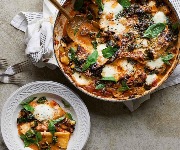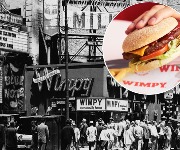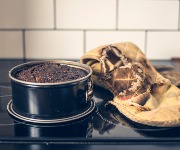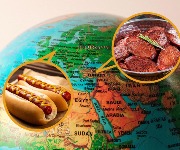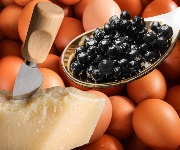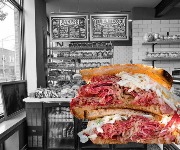loveFOOD meets... nutritionist Amelia Freer
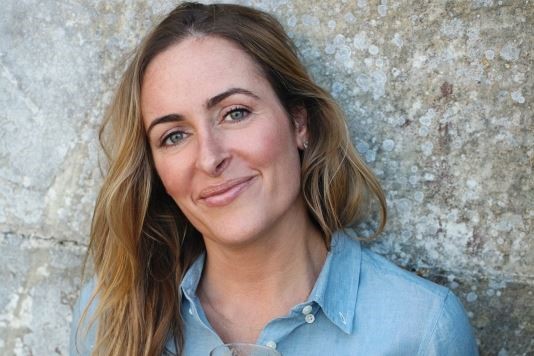
Nutritionist Amelia Freer gives her insight into the ways in which we can take control of our health.
She's against diets and calorie-counting, has high-profile clients such as singer Sam Smith and Boy George among her success stories and an accessible, holistic approach to eating. So it’s no surprise to learn the waiting list for a session with nutritionist Amelia Freer is a long one.
It's also no surprise to learn her first book, Eat.Nourish.Glow, which is a 10-step guide to losing weight, looking younger and feeling healthier, has become a best-seller.
Now a qualified nutritional therapist, she used to work as a PA to the Prince of Wales. Relying on sugary teas, croissants, late-night bowls of pasta and cheese-on-toast to fuel her day, she was constantly tired, and suffering from IBS.
A chat with her flatmate followed by an appointment with a nutritionist was her lightbulb moment.
Making changes slowly but surely
Making the obvious yet easy-to-ignore link between what we eat and how our bodies function is something many of us ignore, so how difficult was it to give up or cut down on things like gluten, sugar, dairy and caffeine?
“It was challenging,” Amelia says. “I had to get my head around it all and battle with my food wants versus my nutritional needs, but it had such dramatic effects on my health, particularly my skin, that I was encouraged early on. I also gave up one thing at a time which helped keep me on the right track.”
In her book, she quotes an instance when a friend who came over for dinner was disappointed to learn Amelia was preparing a salad instead of something stodgy. But it was a salad made with chicken, mango, chillies, coriander and avocado.
It’s flavour we’re craving, not a certain food, she says. “That’s why the first thing I get clients to do is ‘detox’ their kitchen.
"It’s not easy especially if you’re snacker. The list includes cereals, processed foods, canned meals, salad dressings, biscuits and flavoured yoghurts.”
“Once the processed foods are gone and they’ve learnt my easy principles of food assembly, they rise to the challenge,” says Amelia. “They might relapse and come back for a reboot, but that’s partly why I wrote Eat.Nourish.Glow so clients could refer back.”
Diet excuses and a 'lack of time'
There’s always time to make a change, says Amelia. “I often say to my clients, if they have time for Facebook, they have time to cook or exercise. People don’t realise how their time is eaten up, but once you become mindful of what you’re doing, you can make changes.”
“Once you realise how food makes you feel, you reap the benefits so quickly you don’t want to go back,” she continues. “A ready-meal takes 30 minutes to heat up [in the oven] – it takes less time to create a delicious fresh meal of vegetables and protein, once you know how. I’m not a chef and I don’t do fancy stuff, just basic meals that are quick and taste nice.”
But others say why not ‘eat a bit of everything’ and not worry? Amelia is wary of this mantra. “The problem is, most foods that are bad for you can be addictive, so it’s not a ‘little’ for long. Keeping a diary often shows my clients they’re misleading themselves with the amounts they are eating, so I suggest giving that a go.”
The great war: fats v sugar
It’s true that we often think we’re eating better than we are. For example, some people buy processed low-fat products, enhanced by sugars, yet steer clear of foods rich in natural fats such as avocados. “There’s been an enormous amount of misinformation about fats and sugars,” she says. She sums this up in her book when she writes: ‘Too many people counting calories and not enough counting chemicals.’
It’s another slowly-but-surely approach. “Sugar is a huge industry so it takes a while for the message to get through and win the battle,” says Amelia. She’s optimistic though. “Apparently it can take 15 years for scientific research to filter into the mainstream. I think we’ve known about sugar’s effects for over 15 years so hopefully now’s the time.”
The economics of good health
Better living doesn’t have to come at a price. “A lot of vegetables, a little fruit and fresh eggs are the mainstay of eating healthily,” she says. “They don’t have to be expensive. Visit local markets, eat seasonally and check out farm box deliveries. For staples like olive oil, coconut oil, nuts and seeds, buy in bulk online.”
And the pressure to be perfect is off too; as she says in her book, ‘Be consistent, not perfect’. So what’s her personal weakness? “Red wine! And I can lose a bit of control at parties when canapés are served. I know it doesn’t sound true, but I’ve completely re-trained my taste buds – I don’t crave the things that are bad for me anymore.”
It also doesn’t mean being fussy. “If I go to someone’s house, I eat what I’m given. There was a time when I needed to be stricter but I can relax now. I empathise with those who need to avoid certain food groups – I was there once and I know how it feels.”
Breaking habits
In the end, it’s a simple yet effective philosophy. Eat natural foods, exercise more, cook more and drink more water. So why do we find it hard? “To be honest, it is not hard. It’s just habit.”
That’s the crunch. Breaking habits is the biggest challenge off. We snack when we’re hungry – but half the time a glass of water will do the trick.
“Some habits are harder to break than others, but not impossible,” says Amelia. “We’ve also been fed the wrong messages for a long time, so it’s a mindset of beliefs too. But once you break them, you can prioritise your health – and to me there’s nothing more important.”
Photo credit: Candida Boddington
You might also like:
The 7-day detox: does it work?
Ella Woodward and her deliciously healthy success story
Most Recent
Comments
Be the first to comment
Do you want to comment on this article? You need to be signed in for this feature


